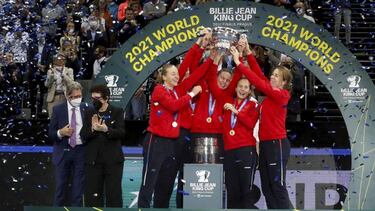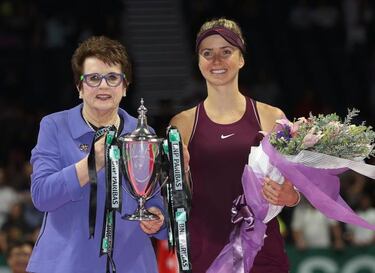Billie Jean King: “Men have the power to change women's tennis”
AS sat down to chat to Billie Jean King - a tennis legend and a staunch defender of women’s rights, who recently had the Fed Cup renamed in her honour.

Billie Jean King (nee Moffit, Long Beach, age 77), is not only a tennis legend, for many years she has been one of the leading voices in the fight for women's rights and social change. The American won 39 Grand Slams (12 in singles, 16 in doubles and 11 in mixed doubles) and was one of the founders of the Women's Tennis Association (WTA). Last year, the International Federation renamed the Fed Cup in her honour and last week, she attended the finals of the tournament in Prague. During her time in the Czech capital, with typical energy, eloquence and sympathy, she sat down to talk exclusively to AS.
What does it mean to you to have a world tennis tournament named after you?
Ohh... (sighs) I'm still trying to figure that out; it is such an honour and a privilege. But what does that really mean? And what can I do with it to make the world a better place? That is what I am trying to do. [When I see it] sometimes I think of my mother, because that is the name she gave me, because my Dad was away at war, during WWII, and she didn't know if he was going to come home. So she named me after my father [Bill] so I think about that. When she was 80 years old, she asked me, ‘Do you like your name?’ and I love my name. And she said, ‘Why?’ And I said because it’s daddy’s name, it’s about my dad - and he did come home. Also,I liked the name because it was different, and I love it. Especially in the old days it was very different. Now the name Billie has become very popular, like Billie Eilish, for example. It's pretty funny. Returning to the question, it’s a responsibility and I hope that with the International Federation (ITF) and all the different federations in the world, we can keep fighting to change the world, for equality, equity and inclusion and everything. That said, I will collaborate in whatever way I can.
Do you like the new format of the Finals considering that you won the Fed Cup seven times with another system?
Actually we didn’t, the very first one was just like this one. When we played in London, it was exactly the same, we played two singles and a doubles. So it’s kind of a full circle to me. I’ll do whatever they want, just tell me the format and it’s our job to adapt. We’ll keep trying, if this one doesn’t work, people have to come up with better solutions, they can’t just keep complaining. You can’t just say, ‘I want this, I want that’ you’ve got to come up with solutions.
What else does women's tennis need to reach more people?
Tennis is in a much better place than any other women's sport. For example, on the subject of earnings. We continue to look for ways to improve. The ITF is not involved in this, it is committed. It's a big job and you have to keep talking for the progress to continue. It is something global, of the whole world, not only of the Federation Cup. Women's tennis is in 210 countries. I don't have all the answers and I'm not the one who has to lead this, but the girls who play now. Fifty years ago, we were in conflict and the crisis was an opportunity. The ITF and the WTA have to work together.

A few days ago, a German player, Andrea Petkovic, said that sexism is still present in tennis. For example, because sometimes women play on smaller courts. what do you think about it?
You are right, there is still a lot of sexism and we continue to experience it in all sports. The challenge is to continue making a difference. The people who have the power to run the tournaments and determine the schedules must change. When I played at Roland Garros, sometimes I had to play at the worst time and on the worst courts. It was as though they just wanted to get us out of the way. And it still happens often today.
And what can be done?
Talking with the directors, I already did it face to face, because it is the only way to find a way for things to change. For example, before there were only ball boys in some tournaments. Many just hadn't realized and so they changed it. For example, the US Open. You need to exchange information and ask for what you want and need. And it may not happen right now, but it will happen in the future. It helps a lot when a man is in charge and becomes an ally of women. They really make a difference. The mostly male-led ITF voted for the equal winnings in the Davis Cup and the Billie Jean King Cup. Men, since they are often in power, can turn things around much faster.

Do you think that the LGTBI issue is still a taboo in the world of tennis?
I think regarding LGTBI, tennis is one of the best sports actually - we are usually one of the best sports. We were the best with the issue of AIDS, because of Arthur Ashe (the African-American former tennis player was infected by a transfusion and announced it at a press conference on April 9, 1992). We are definitely more open than most. We have been good with the LGTBI issue. We were the first - well, almost the first. Martina [Navratilova] and I were ‘outed’ - I was outed and she was going to get outed. I said to her, "If you can, announce it so that you can control the message." So we’ve been out since... 1981? and then I was trying to figure out who I was then. Actually, she said that she was bisexual so we were already figuring things out. But the point is, we talked about it - ourselves and others. The more often someone can come out, the better it will get, because people will start to realize that a lot of people are LGBTQ +. Every family probably, just about every family has somebody! even though they might not know it, they probably have an LGBTQ person in their family. Also, it’s always important to be your authentic self if possible. You lead a much better life if you can do that. But sometimes we are not ready, and you can only do it when you are ready. Your body tells yourself, it sounds odd to say it but it tells you when you are ready.
This week you sent an emotional message to Carla Suárez. What do you think about her?
She has always been so sweet, so nice. But then, when she got cancer, I realized how courageous she is. She was always courageous on the court though - and that’s a good sign when a person has adversity. She was amazing how she fought through it. I could tell by her face that she was sad that she is not going to play anymore, but she will go on and do things. I think she has been very inspirational, I hope life is good to her; I hope to stay in touch with her and I am just thrilled that she is OK because we were all so worried. Boy, she was so brave, just unbelievable. She always had heart though - even when she played, because she’s not that tall so she’s had to have more heart. And she’s quick. She’s amazing and very good too, a very smart player.
A champion on & off the court, @CarlaSuarezNava played her final pro match @BJKCup, a doubles win for Spain.
— Billie Jean King (@BillieJeanKing) November 8, 2021
She beat cancer this spring, & served as an inspiration to all.
Congratulations on a truly remarkable career, Carla. I cannot wait to watch your next chapter unfold. pic.twitter.com/899dxpGBBr
Now a mandatory question - out of the three greats: Federer, Nadal and Djokovic. Which one would you choose?
Oh! (laughs) They are all so different. I love Nadal. You known I met Ilana (Kloss, his wife) and Nadal when he must have been 14 or 15 years old, in South Africa. I don't think he remembers, but we remember! Because I said of all the kids here, who do you think has the most potential? Easy! Nadal! So we went and we watched him, and we thought, 'Oh my gosh, this kid is so good.' So I love watching him play. What I love about him is how much he respects tennis. He gets upset with players when they don't respect the game. And I love that part about him. That is why children respond to him more than anybody. When I talk to children around the world and ask them who their favourite is, I would say Nadal comes in at No.1. When I talk about adults, they say Federer - although a lot of kids love Federer too. But the adults seem to gravitate to him a lot. He’s more balletic, he’s so beautiful the way he plays - it’s almost like dance. But Nadal’s got that grit, he is more earthy, he’s more… they’re both unbelievable. I do think that Djokovic is going to be number one in terms of titles, but you have to understand that when Nadal and Federer grew up together and have been playing each other all the time, they actually hurt each others’ chances of having the most titles. It’s like Martina (Navaratilova) and Chris Evert - if you didn’t have one of them, just take one off the board, the person that’s left would have won a lot more titles. They are all so unique and different.
How do you see them in terms of changing the game?
Djokovic is very intelligent, he’s more upfront about change I think than the other two. I wish the other two weren’t so safe off the court. I wish they would speak up more but you know, everyone’s different, they have to do what they did. Federer spoke about for a day about the association being together, and I went, ‘Yey! Great!’ But it’s a lot of work, and people have no idea about how much work is involved.
Related stories
Finally, would you like to see a Big Three in women’s tennis like we have seen with Federer, Nadal and Djokovic?
Here’s what happens with the media, Ok? When you have a rivalry, they usually say there’s no depth - this is what women have to deal with, I don’t know if the guys do. This is what’s always happened with us. With Chris and Martina, it was like, ‘this is great but do you have any depth?’ Now we have so much more depth [in the women's game]. Then they say, ‘Why don;t you start to have a rivalry…’ Whichever one is, they want the other! It’s good to have both - depth and rivalry. In women’s sports, and women’s tennis in particular, we have much more depth now, because more people are giving us attention but it’s always great to have rivalries - always. I can’t tell who’s going to win anymore - and that’s the good part, you don’t know, but you kind of ache for a rivalry like the one we had between Martina and Chris although that would be hard to duplicate.


